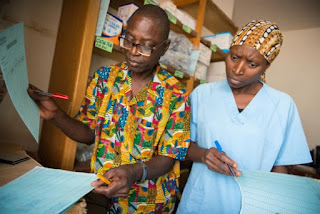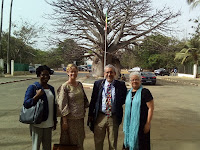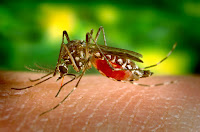
Travel Dates: 28 May - 4 June 2016
Senegal offers several research, training, and service opportunities that may be attractive to UNC school of public health faculty and students in an environment that would be supportive of the school's mission to address “big public health problems with scalable solutions.”Senegal is important to US government interests, with ODA funding at $140 million[1] (FY12), its geographic location and history of peaceful, democratic transitions since independence from colonial France in 1960.
Research
Senegal is home to highly skilled biomedical researchers[2], who are proficient in English, and lead well-equipped university laboratories at the Le Dantec and Fann teaching hospitals[3]. There is also a field research station at Keur Socé, Kaolack Department, with affordable lodging and meals to accommodate guest researchers.The Pasteur Institute of Dakar research facility was established in 1913 and serves as a primary laboratory reference center and one of only four worldwide yellow fever (YF) vaccine manufacturers, producing 10 millions doses per year (<$1 per dose) of the attenuated live YF 17D vaccine strain, derived from a wild-type YF virus (the Asibi strain) isolated in Ghana in 1927, for sub-Saharan Africa. In 2009, the Pasteur Institute of Dakar became the Pasteur Institute of Dakar Foundation, under Senegalese law, and is led by Dr. Amadou SALL, PhD in virology, who is proficient in English and well known for his work on HIV-2, and more recently on Ebola and Zika virus disease research.
The Pasteur Institute of Dakar welcomes graduate and post-graduate trainees and offers them access to affordable accommodations on the Pasteur Institute of Dakar campus. The majority of the Pasteur Institute of Dakar professional staff are proficient in English. The Pasteur Institute of Dakar is a national and international collaborating reference center for enterobacteria, poliomyelitis, arboviruses and hemorrhagic fever viruses, influenza, and rabies. There is a strong mathematical modelling, genome wide-association studies (GWAS) effort by Pasteur Institute of Dakar researchers, led by Dr. Cheikh LOUCOUBAR, e.g., “Better understanding of whether these or other variants interact leading to differential risk compared with individual marker effects will increase our understanding of the genetic architecture of disease, which may be investigated using the family-based study design.”
 Ministère de la santé publique et l'action sociale
Ministère de la santé publique et l'action sociale
The Ministry of Public Health and Social Action (MOH) is led by a dynamic Minister, Dr. Awa Marie COLL SECK, who was previously the Executive Director, Roll Back Malaria Partnership, WHO. Minister COLL SECK has been widely lauded for her transparent leadership in addressing the Ebola crisis in Senegal. Dr. COLL SECK invited me to meet with her and Dr. Sambacor SARR, MOH Research Manager and national IRB coordinator. During our 20 min session, the Minister fully endorsed my presence to Dr. SARR, stating she has full confidence in my representing the UNC Gillings School of Global Public Health, based on my having served on her Board of Directors for 5 years when she led the Roll Back Malaria Partnership at WHO during which time we collaborated on the "Africa Live: Roll Back Malaria Concert" with Grammy-award winning Senegalese musician and humanitarian, Youssou Ndour.The Minister suggested an MOU between UNC and the MOH would allow our two institutions to establish a basis for collaboration and would be very helpful to UNC in engaging with universities, local and international NGOs, bi-lateral, and UN organizations in Senegal. This was, in fact, confirmed by Elizabeth Williams, Health Officer, USAID/Senegal, who said UNC would be well served by having an MOU with the MOH, as the USAID health office works uniquely with MOH and, as such, an MOU between UNC and the MOH would allow access to funding from USAID/Senegal, based on this established relationship of collaboration with the MOH. CDC also has a field office in Dakar that is focusing on the "One Health Workforce" (the human-animal disease interface) to address emerging pandemic threats and the Global Health Security Agenda (GHSA) to prevent, detect, and respond to future infectious disease outbreaks. Senegal is one of 17 GHSA partner countries where the US government intents to invest more than $1 billion in total resources.
 |
| CLICK HERE FOR USAID Interactive Project Map |
Ethical Evaluation - A Pillar of Senegal's National Research Program
 Under the aegis of the National Ethics Committee (NEC), the national research ethics evaluation system is an important pillar of the health research system in Senegal. Established by law on 09 March 2009, the NEC is based at the Ministry of Health (MOH) and coordinated by Dr. Sambacor SARR. The NEC is the only body
authorized to give ethical approval for research conducted in Senegal. There is an institutional review committee (similar to an institutional review board) at The University of Cheikh Anta Diop (UCAD; see more below), of which Dr. SARR is a member. But its radius of jurisdiction
is limited to field protocols developed as part of training at Senegal's graduate schools. There are also additional institutional research centers working with the MOH and universities in Senegal, including the Institutional Research
for Development (IRD) program which has four Demographic Health Observatories in
Senegal, implemented in the villages of Niakhar, Bandafassi,
Mlomp, and Dielmo-Ndiop. Senegalese, other Africans, and Europeans have been trained at these sites, which are also used for clinical trials. For
neglected tropical diseases, Senegal has a specialized health research laboratory based in Saint Louis "Espoir pour la santé (EPLS)."
Under the aegis of the National Ethics Committee (NEC), the national research ethics evaluation system is an important pillar of the health research system in Senegal. Established by law on 09 March 2009, the NEC is based at the Ministry of Health (MOH) and coordinated by Dr. Sambacor SARR. The NEC is the only body
authorized to give ethical approval for research conducted in Senegal. There is an institutional review committee (similar to an institutional review board) at The University of Cheikh Anta Diop (UCAD; see more below), of which Dr. SARR is a member. But its radius of jurisdiction
is limited to field protocols developed as part of training at Senegal's graduate schools. There are also additional institutional research centers working with the MOH and universities in Senegal, including the Institutional Research
for Development (IRD) program which has four Demographic Health Observatories in
Senegal, implemented in the villages of Niakhar, Bandafassi,
Mlomp, and Dielmo-Ndiop. Senegalese, other Africans, and Europeans have been trained at these sites, which are also used for clinical trials. For
neglected tropical diseases, Senegal has a specialized health research laboratory based in Saint Louis "Espoir pour la santé (EPLS)." In summary, Senegal hosts 41 health research centers and NGOs, authorized by and registered in the MOH database, to conduct health research, including 1,500 senior health researchers, 2,500 junior, 3,500 support staff, and about 7,500 temporary staff per year. The MOH has established a knowledge translation system in order to transform the lessons learned and relevant health research results into policy and health practices. The MOH is also developing, with support from the West Africa Health Organization (WAHO), a health information and research for health database that will support the MOH's knowledge management programs.
Programs - IntraHealth International
 |
| Senegal health facility staff. Photo: IntraHealth International |
Led by Babacar GUEYE, IntraHealth/Senegal hosts several projects funded by the Bill and Melinda Gates Foundation (BMGF), the William and Flora Hewlett Foundation, Pfizer, the Global Fund, Merck for Mothers, Capital for Good for the Global Health Advocacy Fund, and USAID.
"Stockouts" in public clinic health facilities are a perennial problem in many low-resource countries due to poor logistical management and commodities tracking. In 2012, with funding from the BMGF and Merck for Mothers, IntraHealth/Senegal contracted with the private sector to use electronic information technology tools to assess facilities' needs for contraceptives and usage trends that would allow them to anticipate the quantity of new commodities needed to always maintain an adequate supply on-hand in the clinic. This "Informed Push Model" has reduced stockouts from over 80% to less than 2% nationally, giving Senegalese women assurance that they can expect their contraceptive of choice to be available when needed.
Partnerships established by IntraHealth/Senegal with the private sector support MOH goals to increase contraceptive prevalence from 16% to 30% in the near future and lead to further improvement in Senegal's health indicators.
 |
| Baobab tree, south of Kaolack, Senegal |
Study Abroad
Study abroad programs in Senegal have long been popular with US universities, including George Mason, University of Minnesota, Boston University, and Harvard, among others, due to the proximity to the US (4 hour time zone difference), positive security situation, political stability, cultural tradition of hospitality “Teranga”, low cost RT airfare ~$1300 direct Washington, DC, - Dakar, low cost - high speed Internet and cellular service throughout the country, and a strong popular arts and cultural environment (music, dance, fabrics, painting, languages).
The Africa Consultants International (ACI) Baobab Center is a well-known NGO based in Dakar that has successfully hosted undergraduate and graduate study abroad, language training, health, social justice, and cross-cultural training programs for over 30 years. Based on my initial discussions with Ms. Rama SOW NIANG, Study Abroad Program Coordinator (who grew up in Arlington, VA), the ACI Baobab Center is quite flexible and could craft a program that would suit UNC student interests, based on ACI’s long history of coordinating study aboard for over 20 US universities, including public health-related service learning programs. I shared ACI Baobab Center’s promotional literature with the Dept of Health, Policy, and Management BSPH Director, Dr. Karl Umble. He is particularly interested in exploring internship/service learning programs in Senegal, as the BSPH undergraduates have a required 10-week service learning experience between their junior and senior years.
Université de Cheikh Anta Diop
 |
| L-R: Mireille Djenno, Emily Burrill, self, Barbara Anderson |
 |
| Parasitology lab of Prof Omar GAYE, UCAD |
[Note: some of you may recall that Professor THIOUB, Dr. Fatimata LY, Head, Faculty of Medicine, UCAD, and linguist researcher Mamarame SECK visited UNC in January 2016.]
During our meeting at UCAD, presentations were given by the Faculty of Medicine, Heads of Department, during a ½ day meeting (I have copies of these which I can share). The strong suit of UCAD Faculty of Medicine researchers has traditionally been infectious disease training and research (parasitology, TB, and HIV/AIDS). However, there is a strong expressed interest in health systems research (HPV screening and immunization; hepatitis B immunization),
 |
| http://www.who.int/nmh/countries/sen_en.pdf |
In terms of English competency, it is worth noting that about one-quarter of the faculty and over one-third of the students with whom we met demonstrated basic English language skills and desired to become more proficient, given, as one professor said, "English is the language of science." Many Senegalese researchers publish in English-language journals.
Hepatitis B and Human Papilloma Viruses
 |
| HPV anti-cancer vaccine. Photo credit: Unicef. |
Cervical cancer and other cancers caused by human papilloma virus (HPV) infection continue to be preventable health problems in Senegal. Recent research has demonstrated that new quadrivalent HPV vaccination was well tolerated when administered in a 3-dose regimen, a 98% seroconversion rate for each vaccine HPV type, and all subjects seroconverted by 4 weeks post-dose 3 after a seven month, double-blind study that enrolled 250 healthy, human immunodeficiency virus (HIV)-uninfected females, ages 9-26, residing in Ghana, Kenya, and Senegal. The MOH is demonstrating the effectiveness of providing HPV immunization to 9-11 yr old girls in an urban school setting in Dakar, with funding from GAVI.
Next Steps
I will be reaching out to UNC faculty members to follow up on this visit and share additional details regarding possible opportunities for training, service, and collaboration with Senegalese researchers.Jim
-----------------------------------------
[1] http://us-foreign-aid.insidegov.com/
[2] Notably: Professor Souleymane MBOUP, PhD, Head, Laboratory of Bacteriology and Virology at Le Dantec Hospital in Dakar; Professor Omar GAYE, PhD, Head, Parasitology Dept, Faculty of Medicine, University of Cheikh Anta Diop; Professor Moussa SEYDI, MD, Head, Infectious Diseases Unit, University Hospital Fann in Dakar;
[3] Equipment such as RT-PCR sequencers, bioMérieux NucliSENS® EasyQ system, Luminex readers, LightSwitch assays, BSL-3 hoods, liquid nitrogen tanks, ultra-low freezers (minus 86 deg C), etc.


